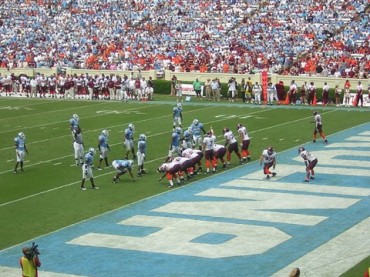
More details have emerged about one of the largest cheating scandals involving collegiate athletes is U.S. history thanks to a new investigative report released Wednesday.
University of North Carolina – Chapel Hill had concocted a massive system to keep student athletes eligible to play, a set-up described by the News & Observer as an 18-year scheme that included bogus classes, inflated grades and a “shadow curriculum” advanced by those in charge.
Everyone from coaches to academic counselors to a top official at the African and Afro-American Studies department were complicit in the scheme.
The N&O reports:
The system of no-show classes at UNC-Chapel Hill was pushed by academic counselors for athletes, hatched and enabled by two sympathetic officials in a key department and employed by coaches eager to keep players eligible, a new report into the long-running scandal has found.
The 18-year scheme generated inflated grades through lecture-style classes that had been quietly converted into bogus independent studies. The report, released Wednesday afternoon, found a new culprit: the Academic Support Program for Student-Athletes.
[The report] found that the academic counselors had pushed for the easy classes and embraced those started by Deborah Crowder, a longtime manager for the Department of African and Afro-American Studies. The report describes a fairly broad group of academic and athletic officials who knew about athletes getting better grades in classes that only required papers, yet taking little or no action.
As The College Fix has previously reported, UNC Chapel Hill students have known for quite some time that athletes were pointed to easy-A classes. Also, details on just how bad the set-up really was has come out in recent years.
In 2012, The College Fix reported on the appalling lack of academic standards that had been revealed within the University of North Carolina’s African and Afro-American Studies department. There was a rampant use of so-called “no-show” classes, where professors weren’t even showing up for classes, and were simply giving students phony grades. There was almost no accountability, despite widespread neglect and corruption. No one, it seems, wanted to question what was going on within the department.
Wednesday’s report suggests many employees knew about the situation, as the News and Observer reports:
It was common knowledge within the support program that the classes didn’t meet, were easy and offered high grades, the report says. They became such a crutch that when Crowder retired in 2009, football team counselors were desperate for the classes to continue, warning coaches the team’s overall GPA would plummet, which it did.
But some in the program knew that the classes, which typically required a term paper at the end, lacked a professor. Crowder played that role, even though she only had a bachelor’s degree from UNC. She created the classes – often at the counselors’ requests – collected the papers and graded them, often without reading them, the report said.
What adminsitrators knew, and when they knew it, is a different story:
“We found no evidence that the higher levels of the University tried in any way to obscure the facts or the magnitude of this situation,” the report said. “To the extent there were times of delay or equivocation in their response to this controversy, we largely attribute that to insufficient appreciation of the scale of the problem, an understandable lack of experience with this sort of institutional crisis and some lingering disbelief that such misconduct could have occurred at Chapel Hill.”





Please join the conversation about our stories on Facebook, Twitter, Instagram, Reddit, MeWe, Rumble, Gab, Minds and Gettr.